By new contributor Matthew J. Silver
 The SAFE Act (Secure and Fair Enforcement for Mortgage Licensing Act) did not seem fair at all to the forty-plus attendees at the Indiana Manufactured Housing Association’s panel discussion on December 16, 2010 in Indianapolis, IN. Nor did it make them feel more safe or secure. Au contraire, many no doubt left feeling they were being singled out by a federal government regulation enacted in response to the mortgage lending crisis. The SAFE Act has created new challenges for the manufactured housing industry.
The SAFE Act (Secure and Fair Enforcement for Mortgage Licensing Act) did not seem fair at all to the forty-plus attendees at the Indiana Manufactured Housing Association’s panel discussion on December 16, 2010 in Indianapolis, IN. Nor did it make them feel more safe or secure. Au contraire, many no doubt left feeling they were being singled out by a federal government regulation enacted in response to the mortgage lending crisis. The SAFE Act has created new challenges for the manufactured housing industry.
A significant SAFE Act requirement is for Mortgage Loan Originators (MLO’s) to take training and continuing education. MLOs also must undergo extensive background checks to become certified, register with the Secretary of State and with the Nationwide Mortgage Licensing System and Registry. These costs of the licensure process and related requirements present a financial hindrance, particularly for independent retailers and communities, but it certainly increases costs for compliance to everyone involved in lending and related activities.
The SAFE Act was part of the Housing and Economic Recovery Act (HERA) of 2008, and the law went into effect July, 2010. The states were given the responsibility to enact laws and enforce the regulations. But as Mark Bowersox, Executive Director of Indiana Manufactured Housing Association (IMHA), said, “The government has not issued a clear and definitive ruling on the intent of the regulation, but the bottom line is that only licensed Mortgage Loan Originators can discuss terms of a credit sale.”

Mark Bowersox, Executive Director of the Indiana Manufactured Housing Association opens the discussion by laying the background of the SAFE Act in Indiana.
Bowersox introduced the panel, which included Mark Tarpey, supervisor with the Indiana Department of Financial Institutions, charged with overseeing the enforcement of the SAFE ACT in Indiana; Carl Becker, Indiana Manufactured Housing Association’s (IMHA) lead attorney; and Ken Rishel, principal of Precision Capital, a manufactured housing lender and member of the Manufactured Housing Institute’s (MHI) Finance Committee, experienced working with federal regulations affecting the industry.

Left to right: Ken Rishel, Carl Becker, and Mark Tarpey. Tarpey said the DFI can look at hypothetical contracts, and based on current information, can say yay or nay as to the need for an MLO.
Rishel said unintended consequences often occur whenever laws are passed in a hurried knee-jerk fashion. This law originally was not thought to have much of an effect on the manufactured housing industry. It was supposed to get rid of the guys making phony applications and liar’s loans, not $20,000 loans on manufactured housing. But, Rishel said, “Nationally, it’s a mess. Each state has different regulations, making it especially difficult for owners doing business in more than one state.”
Citing the Dodd-Frank Wall Street Reform and Consumer Protection Act (Dodd-Frank Act), passed this year, Rishel said you do not see much reference to mortgage lending. “What you see is primary residence loans and primary residence lending. It blurs the distinction between chattel lending and mortgage lending. It also “…raises the cost of loan origination beyond the 6% we’re allowed to charge…. We figure it’s going to run around $4000 for a chattel loan. If a customer is borrowing $10,000, how can you add $4000 to this loan and expect the customer to pay? That’s crazy! Also, there are new requirements for appraisals that make it almost impossible to reach the standard they want for chattel loans.”
The soon-to-be established Bureau of Consumer Financial Protection, an agency inside the Federal Reserve System, with a surprising first year $500 million budget, is charged with protecting consumers from abusive financial products. It is assuming responsibilities from several other agencies, like the FTC and HUD, as well as the Dodd-Frank Act, and will eventually administer the SAFE Act. Said Rishel: “Who are they part of, who do they report to? The Federal Reserve. Who runs the Federal Reserve? Ex bankers.”
The banks are going to take some hits on their credit and debit cards, he noted, but the fundamental issues of the banking business will remain, especially with the bankers in charge. As the new Golden Rule says, ‘Them that have the gold, rule.’
“This new agency will be pro-active, not complaint driven. They will have agents looking for violators,” Rishel stated. “Who will they go after? It’s us, guys, we are the low hanging fruit. We have a lot of people engaged in this business who have been around for years, some are not legal, some are not compliant. If there’s five to ten billion in our loans out there across the country we’re going to be picked first. We are the low hanging fruit. There are others they will go after, but we’re easy, they may try to make their bones on our back. The car guys were nailed by this ten years ago.”
Elizabeth Warren is an Assistant to the President and a Special Advisor in the Treasury Department who is overseeing the development of the CFPB, and the possible new director. Rishel called Warren extremely anti-business. Indeed, some banking groups say Warren could hurt the availability of credit, especially to low income people.
As with much legislation enacted by Congress, the implementation and enforcement is delegated to others. Bowersox said this new agency is scheduled to be up and running by July, 2011. But there are many grey areas that need to be clarified, such as relating to pulling credit reports. The government asked for industry input on a proposed rule, but then did not consider our input for the final regulation, noted Bowersox. He said, “That final regulation has not yet happened, although here in Indiana our law went into effect July 1, 2010, to begin enforcing that final regulation that has not happened.” The audience chuckled. The MLO regulation is being enforced, but other areas remain in limbo.
Several scenarios were raised by audience members, who were perhaps seeking ways to get around the new licensure statute. Attorney Becker replied: “You would have to appear in court, the judge would ask why you structured the document the way you did, and you would undoubtedly lose. Even if I represented you,” Becker stated, smiling. The attorney said if you have so much as a sheet of paper that displays possible credit rates on your counter that the customer can see, you may be in violation. You utter one word about financing or loan terms, you could be subject to substantial fines, as much as $25,000 per incident. For a company that processes multiple contracts a month, those sums can add up quickly.
Indiana and several other states were successful in exempting retailers who are only handing credit applications to customers. They will not be affected as long as they do not receive compensation for the referral to an outside lender.
Attorney Becker distributed an outline of very specific steps to take, according to Indiana law and the SAFE Act, if you want to structure a lease correctly. (footnote 1) However, this law has not been tested, and could very well be struck down by a future court ruling. Rishel said, “Based on Dodd-Frank, it is fairly certain the federal government is not going to allow RTOs and LO and LTPs to get out from under licensing when they implement their new rules.”
“As long as it is…a loan secured by a dwelling,” Mark Tarpey said, “it would fall under the SAFE Act jurisdiction and that would require an MLO. That’s the trigger, and until we hear otherwise from HUD, that is how we are interpreting this regulation.” He added: “In the past, if you sold goods or services on a retail installment sales contract, and you had more than 25 transactions a year, you were required to register with DFI. That will be gone. The only way you can get an MLO license with DFI or with the Secretary of State is to be tied to an entity, and that entity has to be licensed.” The entity can be an LLC (limited liability corporation) with only one employee, and that person can be the MLO.
Tarpey agreed it is unprecedented to give this new agency so much money and power, and suggested, “Congress may have to revisit this issue.” Meanwhile, “DFI began licensing mortgage lenders who were the named creditor and funder of first lien mortgage loans in January of 2009,” he stated. “Mortgage brokers who find loans for customers and MLOs who work for them are licensed by the Secretary of State. Table-funded loans are considered brokered loans (footnote 2) and are also regulated by the Secretary of State.”
When Tarpey was asked if anyone is under scrutiny or if any fines have been levied, he said no. “We have been trying to educate retailers and community operators since the law went into effect in July of this year about the SAFE Act. People have been compliant so far, and we hope that continues. We haven’t found any violations,” he stated. Mark Bowersox agreed: “DFI has visited dozens of communities throughout Indiana but to my knowledge no penalties have been given.”
A couple in the back of the room said they have a ten unit manufactured home community, and they charge a flat 10% interest rate on the sale of a home on their lot. Rishel said the new agency will eventually find them and demand to see their books.

A member of the audience is asking the panel for specifics about becoming an LLC so they can provide loans according to the new regulations.
Rishel wrote in an email: “The first goal of the MHI Dodd-Frank Task Force, and my personal goal, is to get chattel lending treated differently than real property lending because it is different. Chattel lending on manufactured homes should have never been included in the SAFE Act, and does not belong as part of the SAFE Act, as the burden of licensure is too odious and too costly for the dollar amounts involved, and for those who make up the majority of those lending in this manner. Exclusion of chattel lending from both the SAFE Act, and other laws aimed at real property lending, should be the first and primary goal of the Task Force. Any other action should be secondary or a fall back action.”
To this end, Rishel strongly implored the members of IMHA to stay in touch with their association. He and other members of MHI (Manufactured Housing Institute) paid attorneys out of their own pockets to research the new laws. “We will be coming up with a plan, probably in January, contacting the state associations for support in trying to sway Congress to make amendments to these regulations before this new Consumer Financial Protection Bureau gets going. You will be asked to contact your senators and members of Congress,” he told those assembled. When the changes are made at the national level, you will need to weigh in on your state representatives to change state law accordingly, he added.
Rishel sounded a dire prediction: “We should have seen this coming. This is critical. If we walk away from Dodd-Frank, three years from now we will not have a lender in the industry. This is life or death for the whole industry. We need to pull together and get the exemptions we need.”
Certainly, while Mr. Rishel’s points were compelling, the thrust of MHI and the various state associations is precisely to prevent that from happening. This is one reason why Rishel and others strongly encourage actively engaged association membership. It is strength in numbers that can get and keep the manufactured housing industry moving out of such irksome challenges s Dodd-Frank and the SAFE Act. What is obvious from a meeting such as this one, is that without good legal counsel, which is far more expensive than association membership, the risks faced by an independent retailer or community operator are now too great to ignore.
(1) Indiana manufactured Housing Association members can see the attached file, Basics on Lease to Own, or contact Carl Becker for more information. (317) 598 4529
(2) A lending method employed when a loan originator does not have access to the money necessary to make loans and then hold them until it has enough to sell on the secondary market. As a result, the originator forms a relationship with a lender who provides the funds for closing and immediately takes an assignment of the loan. This is called table funding. Under regulations of the Department of Housing and Urban Development, table-funded loans must disclose service release premiums–profit received by the originator–on the loan closing settlement statement. Loans sold on the secondary market do not have to make those disclosures.
Photos by Matthew J. Silver, free lance writer
##




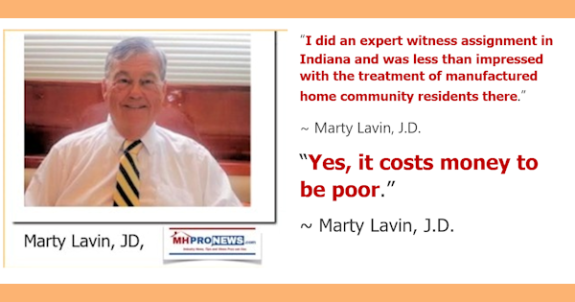
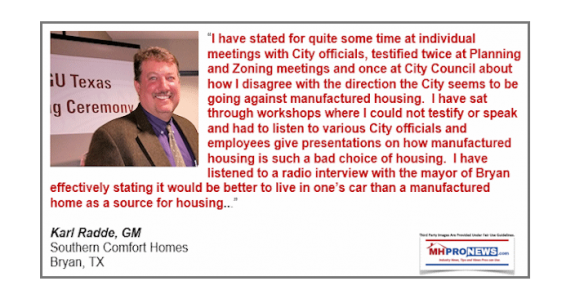
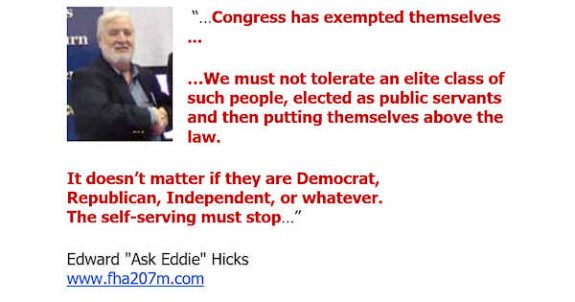
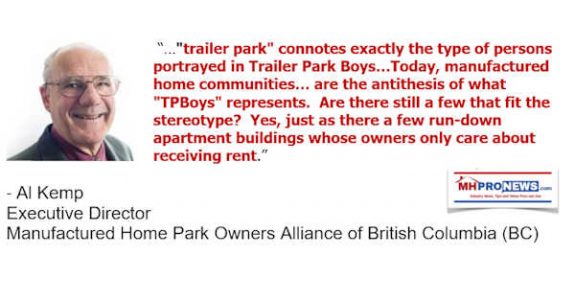
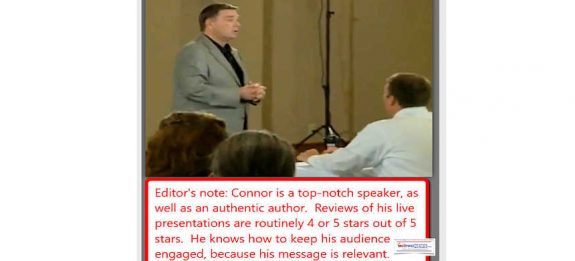
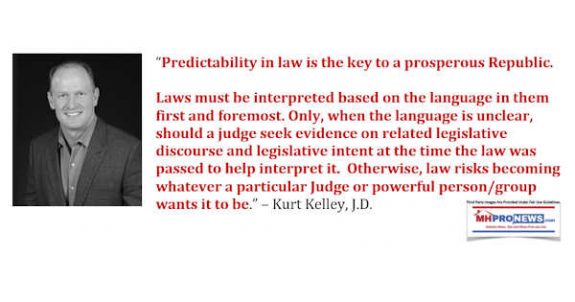
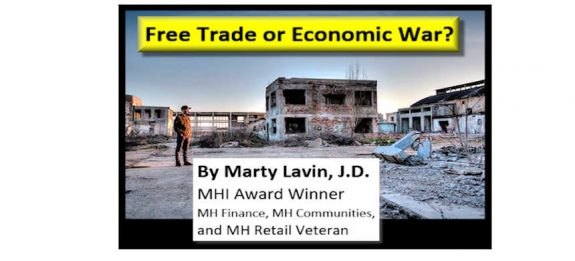
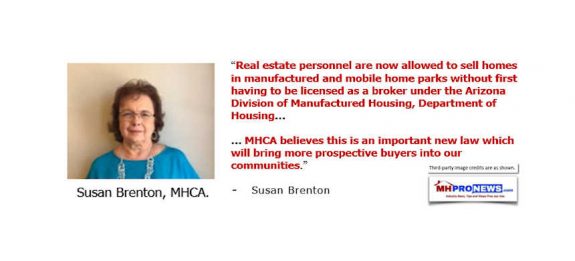
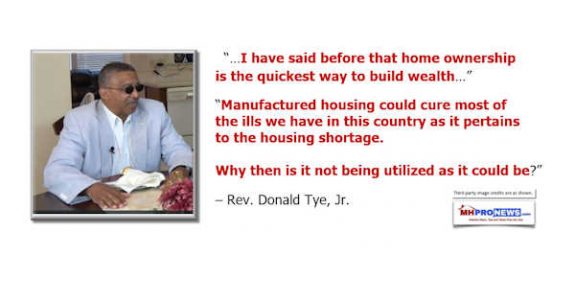
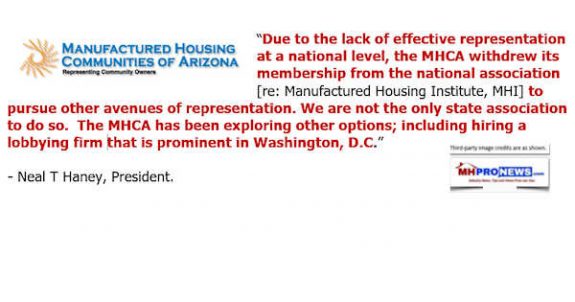
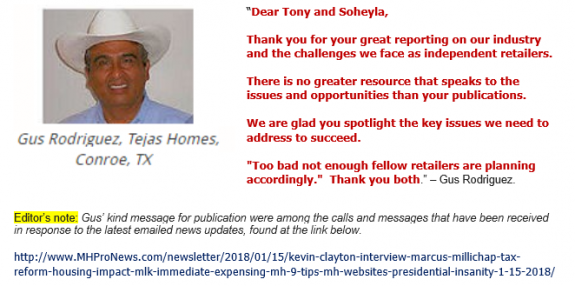
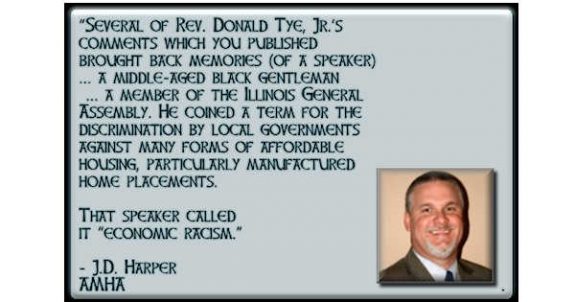
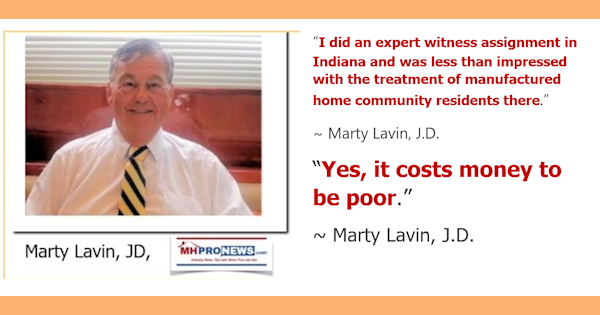
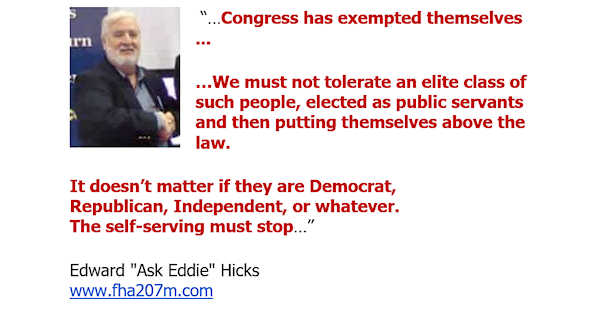
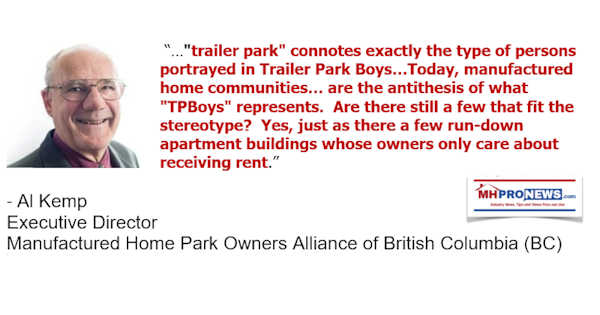
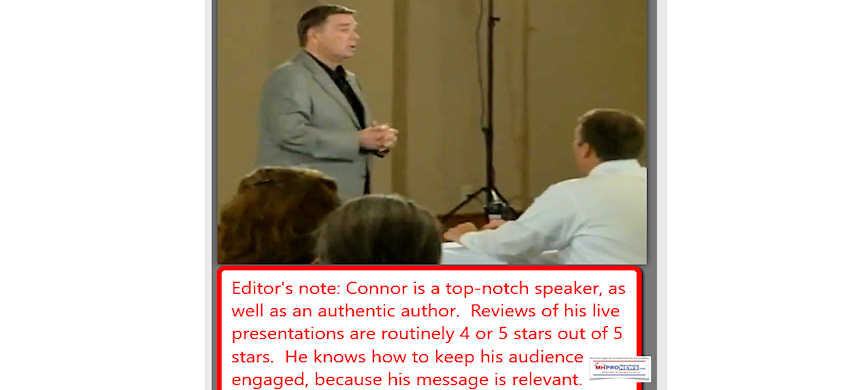
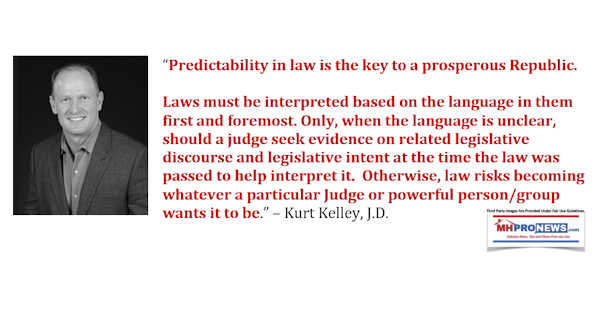
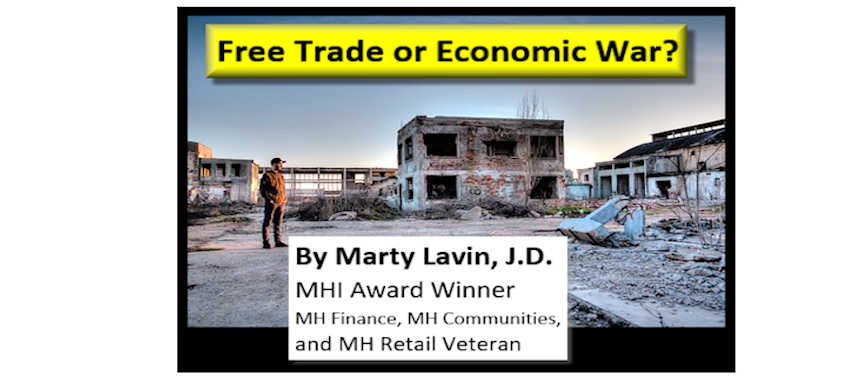
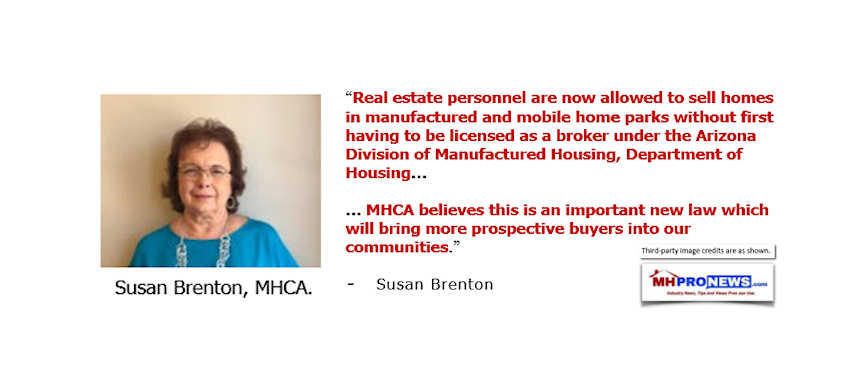
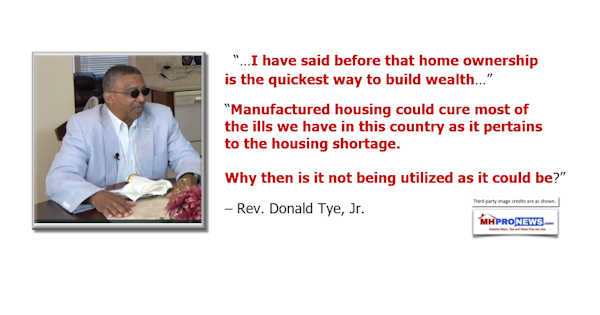
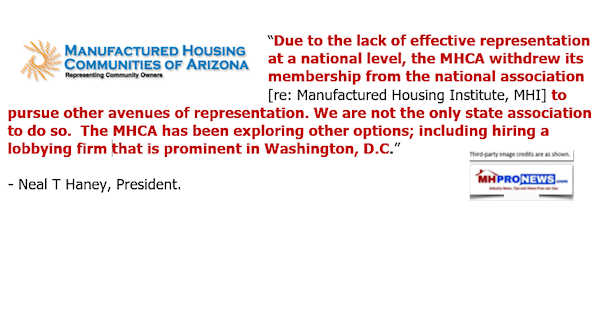
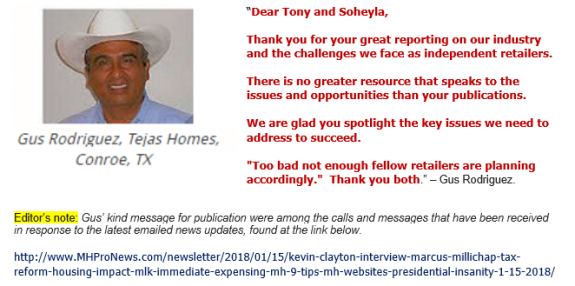
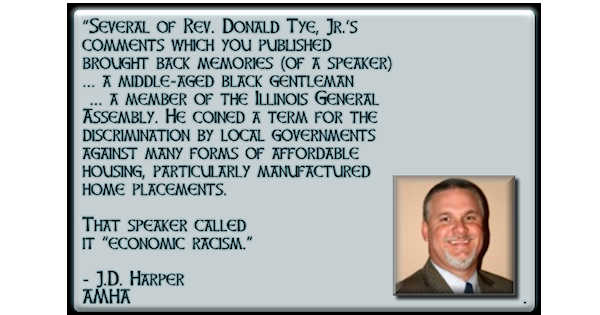
Karl Radde – TMHA, MHI, Southern Comfort Homes – Addressing Bryan City Leaders, Letter on Proposed Manufactured Home Ban
To All Concerned [Bryan City Officials, Others]: As the retail location referenced by Mr. Inderman, I would like to take a moment to address the …